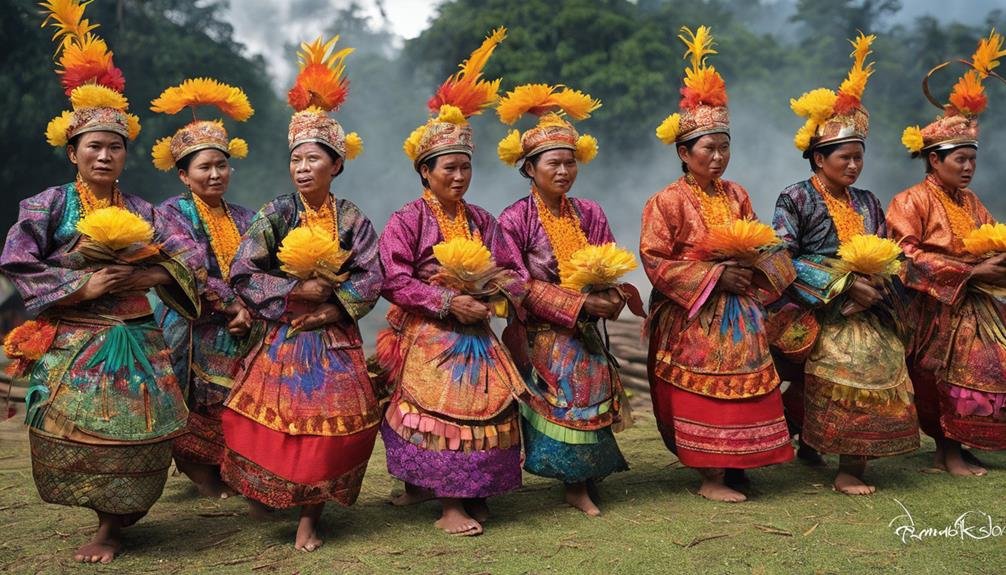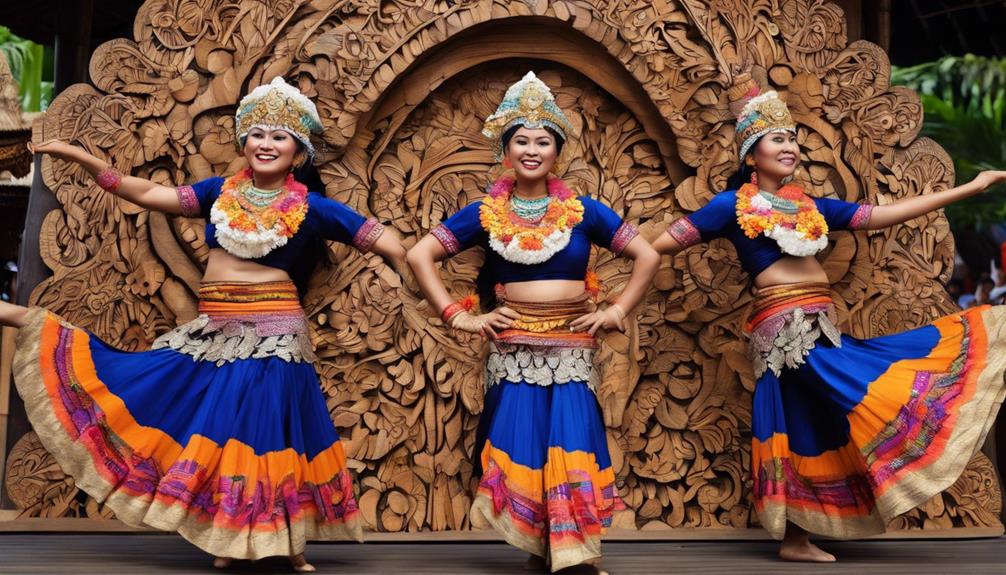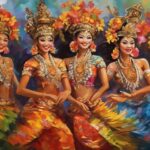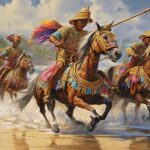Immerse yourself in the ancient rhythms and vibrant traditions of the Rambu Solo Festival in Indonesia. Experience a cultural extravaganza steeped in ancestral reverence and spiritual practices. Witness sacrificial rituals honoring deceased ancestors, colorful traditional attire, and intricate decorations that tell stories of Torajan culture. Feel the pulsating rhythms of bamboo flutes and drum beats in mesmerizing music and dance performances. Discover how this festival deeply influences the Torajan community, fostering unity, economic benefits, and livelihoods. There's a rich fabric of history, significance, and cultural richness waiting to be explored further.
Key Takeaways
- Originates from ancient Torajan funeral tradition.
- Ceremonial practices honor deceased spirits.
- Traditional attire includes colorful woven fabrics.
- Music and dance performances showcase cultural beliefs.
- Festival contributes to community bonding and local economy.
History of Rambu Solo Festival
Originating from the ancient Torajan funeral tradition of Rambu Solo, the Rambu Solo Festival in Indonesia is a revered cultural event with roots dating back to the 9th century AD. This festival's ancient origins are deeply intertwined with ceremonial practices that pay homage to the spirits of the deceased. The Torajan people meticulously uphold these traditions, believing that the elaborate burial rituals are essential for guiding the souls of their loved ones to the afterlife.
The ceremonial practices associated with the Rambu Solo Festival are meticulously planned and executed, showcasing the Torajan tribe's rich cultural heritage. Months of preparation go into this event, with intricate customs, traditional offerings, and sacrificial ceremonies playing a critical role. These practices not only honor the departed but also serve to protect the community from misfortune, making the festival an important aspect of Torajan society. The festival stands as a tribute to the deep respect and reverence the Torajan people hold for their ancestors, highlighting the enduring significance of these ancient traditions.
Cultural Significance
The cultural significance of the Rambu Solo Festival in Indonesia is deeply ingrained in the traditions and beliefs of the Toraja community. This event isn't merely a festival but a sacred time where spiritual practices and ancestral reverence take center stage.
The Toraja people use this festival as a way to honor their deceased ancestors, guiding their souls to the afterlife with respect and harmony. It serves as a profound reminder of the interconnectedness between the living and the dead, showcasing the strong cultural heritage of the Toraja tribe.
The Rambu Solo Festival is a community celebration where traditions are upheld, and rituals are performed in intricate detail. Through these elaborate ceremonies, the Toraja people pay homage to their roots and strengthen the bonds that tie them to their past.
It's a time of reflection, remembrance, and a tribute to the rich cultural heritage that defines the Toraja community.
Traditional Ceremonies and Rituals
During the Traditional Ceremonies and Rituals of the Rambu Solo Festival in Indonesia, participants engage in sacrificial rituals to honor their deceased ancestors. These rituals hold deep ritual symbolism for the Toraja community, signifying respect for ancestors and the cycle of life and death. Community participation is integral to these ceremonies, with family members coming together to guarantee a smooth passage for the departed soul during the festival.
| Ritual Symbolism | Community Participation | Traditional Dances | Music Performances |
|---|---|---|---|
| Represents respect for ancestors and the cycle of life and death | Family members actively participate in ensuring a seamless passage for the departed soul | Integral part of the ceremonies, depicting cultural stories | Performances accompany the rituals, enhancing the ceremonial atmosphere |
The sacrificial rituals of water buffaloes and pigs are not only a form of honoring the deceased but also a way to show reverence for the interconnectedness of the community with their past. As the traditional dances and music performances echo through the ceremonies, they create a profound and immersive experience for all involved.
Costumes and Decorations
Immerse yourself in the vibrant mosaic of colors and intricate details that adorn participants in the Rambu Solo Festival, showcasing traditional Torajan attire and elaborate decorations. The cultural vibrancy of the festival is evident in every stitch and ornament, reflecting the rich heritage of the Torajan community.
- Traditional Attire: Male participants don colorful woven fabrics paired with headbands embellished with feathers, exuding a sense of strength and tradition. Women grace the event in elaborate hairstyles and jewelry crafted from precious metals and stones, symbolizing elegance and grace.
- Ceremonial Accessories: Men proudly carry ceremonial spears or swords, adding a touch of regality and history to their ensemble. These accessories not only serve as decorative elements but also hold deep cultural significance in the Torajan tradition.
- Decorative Elements: The festival venue comes alive with elaborate floral arrangements, palm leaves, and handwoven banners sporting intricate patterns and symbolic designs. These decorations not only beautify the surroundings but also serve as visual storytellers of the Torajan culture, creating an immersive experience for all attendees.
Music and Dance Performances
As you immerse yourself in the vibrant atmosphere of the Rambu Solo Festival's music and dance performances, you'll witness the pulsating energy of traditional Torajan rhythms echoing through the air.
Colorful traditional dances, accompanied by the melodies of bamboo flutes and the resonating beats of drums and gongs, create a captivating spectacle.
The intricate choreography and vivid attire of the dancers tell stories of ancestry and cultural beliefs, enveloping you in a mesmerizing display of Torajan culture.
Energetic Cultural Rhythms
Energetic rhythms infuse the air at the Rambu Solo Festival in Indonesia, where traditional music and dance performances bring to life the vibrant cultural heritage of the Toraja tribe. The beating of drums and the melodious tones of bamboo flutes echo through the festival grounds, creating a lively and spirited atmosphere that pays homage to centuries-old traditions. Dancers, dressed in elaborate and colorful traditional attire, move gracefully to the rhythm, telling stories of the tribe's history and beliefs through their movements. The performances not only entertain but also serve an essential purpose, guiding the spirits of the deceased to the afterlife and honoring their memory in a way that's deeply rooted in the cultural celebrations of the Toraja tribe.
- The festival showcases unique instruments like bamboo flutes, drums, and gongs, enhancing the traditional music performances.
- Dancers adorned in colorful traditional attire gracefully depict stories and traditions passed down through generations.
- The music and dance performances play a crucial role in honoring the deceased and guiding their spirits to the afterlife.
Colorful Traditional Dances
Colorful traditional dances at the Rambu Solo Festival in Indonesia showcase the vibrant cultural heritage of the Toraja people through intricate movements, vibrant costumes, and rhythmic beats that mesmerize spectators.
These dances hold deep symbolism, serving as a form of cultural storytelling where each movement and costume detail conveys a specific meaning.
Through artistic expression, the Toraja community unites during these performances, strengthening their bonds and traditions.
The Ma'randing and Ma'badong dances, performed to honor the deceased and guide their spirits to the afterlife, are prime examples of how these dances reflect the spiritual beliefs and rituals of the Toraja people.
Accompanied by traditional music played on bamboo flutes, drums, and gongs, these dances offer a complete sensory experience that immerses attendees in the rich Torajan culture.
Tourist Experience and Tips
Immerse yourself in the vibrant cultural fabric of the Rambu Solo Festival in Indonesia by witnessing traditional Torajan funeral rituals and exploring local markets for unique crafts and culinary delights. As you explore this enriching experience, here are some tips to make the most of your visit:
- Try Local Cuisine: Indulge in the flavors of Torajan dishes like Pa'piong, a traditional method of cooking using bamboo tubes, offering you an authentic taste of the region's culinary heritage.
- Engage in Cultural Immersion: Participate in the various activities and ceremonies of the festival to gain a deeper understanding of the Torajan culture and traditions, creating lasting memories of your time in Indonesia.
- Seek Local Guidance: Enhance your experience by hiring a knowledgeable local guide who can provide valuable insights into the significance and practices of the Rambu Solo Festival, enriching your cultural journey in this fascinating destination.
Impact on Torajan Community

The Rambu Solo Festival in Indonesia deeply influences and enriches the Torajan community through its cultural significance and economic contributions. This vibrant festival fosters community bonding by bringing together different clans and families to collaborate in organizing its elaborate ceremonies. As community members actively participate in preserving and upholding the traditions of the festival, a strong sense of unity and solidarity is strengthened among the Torajan people.
Moreover, the Rambu Solo Festival provides significant economic benefits to the local community. The influx of tourists during the festival creates opportunities for locals to engage in various economic activities, such as selling traditional crafts, offering accommodations, and providing guided tours. This not only boosts the local economy but also supports the livelihoods of many community members. By combining cultural heritage with economic opportunities, the Rambu Solo Festival plays a crucial role in sustaining the Torajan community's traditions and prosperity.
Frequently Asked Questions
What Traditional Ceremony Is Rambu Solo?
Rambu Solo is a deeply rooted traditional ceremony with immense cultural significance. Its intricate ritual practices, including animal sacrifices, symbolize respect for ancestors and guide spirits to the afterlife. It's a profound cultural expression.
Why Is the Price of Rambu Solo Expensive?
The price of Rambu Solo is expensive due to its deep cultural significance and the economic factors involved. Special offerings like buffaloes and pigs contribute to the high costs, reflecting the importance of honoring the deceased.
Does the Tradition of Rambu Solo Still Continue to This Day?
Yes, the tradition of Rambu Solo continues to this day, showcasing the cultural preservation and generational traditions of the Toraja people. Families honor ancestors with elaborate ceremonies, ensuring a peaceful passage to the afterlife.
What Religion Is the Rambu Solo Ceremony?
The Rambu Solo ceremony blends animistic traditions with Christian influences. Its cultural significance lies in honoring the deceased and maintaining a connection between the living and spirits. Hindu influence can also be observed in some aspects of the ritual.
Conclusion
As you leave the vibrant Rambu Solo Festival in Indonesia, you carry with you a deep appreciation for the rich cultural heritage and traditions of the Torajan community.
The colorful costumes, intricate rituals, and lively music and dance performances have left a lasting impression on you.
Remember to immerse yourself in the local customs, savor the unique experience, and support the community by respecting their traditions.
Until next time, may the spirit of Rambu Solo Festival stay with you.


